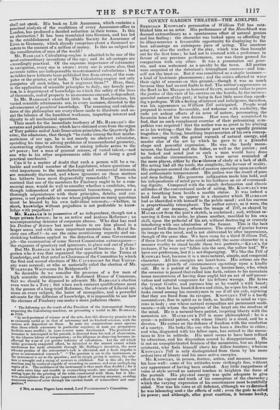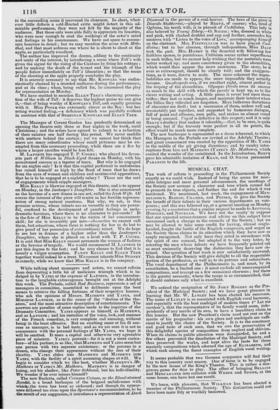COVENT GARDEN THEATRE—THE ADELPHI.
SHERIDAN KNOWLES'S personation of William Tell has esta- blished him as an actor. His performance of the Hunchback was deemed extraordinary as a spontaneous effort of natural genius and fine feeling : the character was looked upon as affording by its idiosyncrasies a favourable opportunity for displaying to the best advantage an extempore piece of acting. The amateur actor was also the author of the play, which was then brought out for the first time; he had not to contend with a preference in favour of any previous performance, nor was there ground for comparison with any other. It was a personation rid gene- ris, and was welcomed as a novelty by the town. All parties- were surprised at the debutant's triumphant success—and him- self not the least so. But it was considered as a single instance— a kind of histrionic phenomenon ; and the critics a&cted to wave their right of censure on this ground,—though it was as much because they had no real faults to find. The author's appearance as the Bard in his Masque in honour of Score, seemed rather to prove the justice of this view of his success on the boards, by the inconse- quential nature of the part ; it being in fact little more than speak- ing a prologue. With a feeling ofiuterest and indulgence, therefore, was his appearance as William Tell anticipated. People went prepared to receive favourably, and welcome with cordiality, the rude yet ardent efforts of an actor of nature, personating the favourite hero of his own drama. How were they astonished to find, that no such complacent exercise of their patronizing sym- pathies was required ! that the author.was as great in his playing as in his writing—that the dramatic poet was an equally genuine tragedian ; the living, breathing impersonation of his own concep- tion; teeming with the genial warmth of natural energy, and master also of the art by which he gave to it a graceful shape and powerful expression. He was the hardy moun- taineer, the husband and the father, as well as the patriot ; and he looked and acted just as such a man would have done under similar circumstances. You were never reminded of the mere player, either by the evidences of study or a lack of skill.. His acting had all the truth, the simplicity,. the fervour of reality. His eloquence seemed the effect of passion operating upon an ardent and enthusiastic temperament. His pathos was the result of pure and deep feeling. His generous indignation made him bold, and his independence of mind gave to his boldness an air of command- ing dignity. Compared with the stately declamation and classic attitudes of the conventional mode of acting, Mr. KNOWLES'S was as a breathing form beside a marble statue. It was indeed a bold deed in him to appear in a character which MACREADY had so identified with himself in the public mind ; and his success is proportionably triumphant. The author enters, as it were, the temple, of our memory, where the image of_ Tell, aa.shaped by MACREADY from the poet's sketch, is enshrined ; and, without re- moving it from its niche, he places another, moulded by his own skill, upon the pedestal of his art, without destroying or scarcely interfering with our admiration of the former. This is the best praise of both these fine performances. The stamp of genius leaves its image on the mind, and is not obliterated by after impressions, though of the same idea. We have room for a third William Tell, if there lived the actor who could embody the same character in a manner worthy to stand beside these two portraits,—KE AN'S, fur instance, if he were not "fallen into the sere, the yellow leaf." We have our preference, but it is not disparaging. We like the Tell of KNOWLES best, because it is a more natural, simple, and congenial character. All his energies are heart-born. His actions are the spontaneous growth of circumstances operating upon a kindly soil. He is a patriot of the hearth—a hunter-hero, who, when the occasion is passed that called him forth, retires to his mountain home unconscious of having done aught but an act of self-preser- vation and natural vengeance for his fellows' wrongs. He hates the tyrant Gesler, and pursues hiM as he would a wild beast; which, when he has hunted down and slain, lie wipes his brow, and looks round among his countrymen to see if all are safe, rejoicing that they are freed from its ravages. KNOWLES'S Tell is a hardy mountaineer, free in spirit as in limb, as healthy in mind as vigo- rous in body ; one whose natural sympathies are permanent senti- ments—with whom the impulses of the heart are the resolves of the mind. He is a natural-born patriot, inspiring liberty with the mountain air. MAcnEanfe Tell is more philosophical : lie is a
cynic—a political patriot, with whom liberty is a creed, and he a devotee. He enters on the defence of freedom with the resolution of a martyr. He looks like one who has been a dweller in cities.; and who, disgusted with his fellow-men, has retired to the moun- tains to live in solitude. His mind seems to have been refined by education, and his disposition soured by disappointment. He
is not an unsophisticated denizen of the mountains, but an Alpine aristocrat, who feels himself above his fellow-hunters; whereas KNowLEs's Tell is only distinguished from them by his more ardent love of liberty and his more active energies. Mr. KNOWLES, in person, feature, action, and manlier, became his hero well : some of his attitudes were strikingly fine, without
any appearance of having been studied. Any little ruggedness of
voice or style served as natural touches to heighten the force of the portrait. His physical energy was quite adequate to give
effect to the vigour and truth of his conception of the character ; which the varying expression of his countenance most beautifully .aided. Nor was his voice at all deficient, although we utderstocd he was labouring under the effects of cold; even the gods testified its power; and although, after great exertion, it became husky,
in the succeeding scene it recovered its clearness. In short, what- ever little defects a cold-hearted critic might detect in this ad- mirable performance, they were not felt by the majority of the audience. But those only were able fully to appreciate its beauties, who were near enough to read the workings of the actor's mind and feelings in his countenance. We have not space to enume- rate beauties in detail ; but we may mention the scene with Meic- that, and. that most arduous one where he is about to shoot at the apple, as particularly excellent.
The author has improved the drama, adding to the continuity and unity of the interest, by introducing a scene where Tell's wife gives the signal for the rising of the Cantons by firing his cottage ; and by making the death of the tyrant and the triumph of the people follow immediately on Tell's liberation; so that the scene of the shooting at the apple properly concludes the play. It is scarcely necessary to say that Mr. KNOWLES was enthu- siastically cheered by a crowded audience during the performance, and at its close ; when, being called for, he announced the play for representation on Monday. We have omitted to mention ELLEN TREE'S charming persona- tion of the wife of Tell: it deserves the highest praise we can give it—that of being worthy of KNOWLES'S Tell, and equally genuine with it. Miss PooLE was extremely clever as the Boy : but her acting wanted feeling,—a deficiency which was painfully evident in contrast with that of SHERIDAN KNOWLES and ELLEN TREE.




























 Previous page
Previous page